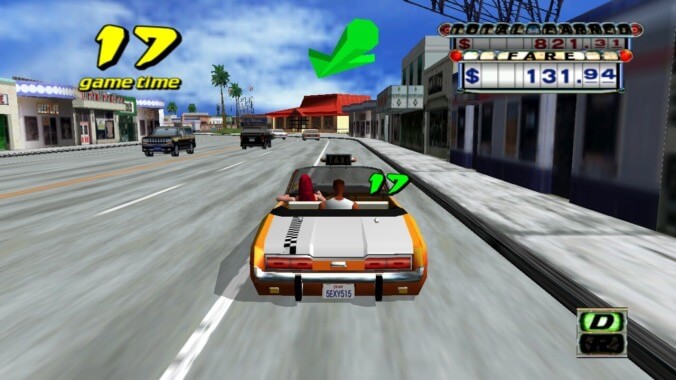The original Crazy Taxi is a lost time capsule of the year 2000

Every Friday, A.V. Club staffers kick off our weekly open thread for the discussion of gaming plans and recent gaming glories, but of course, the real action is down in the comments, where we invite you to answer our eternal question: What Are You Playing This Weekend?
As we wrap up Y2K Week here at The A.V. Club, I thought it would be fun to look back at one of my favorite 2000 video game releases (and one of my all-time favorite games): Crazy Taxi. The home console version of Sega’s arcade hit came to the soon-to-be-doomed Dreamcast in 2000, and, thanks to subsequent updates and re-releases, it’s still easy to get a copy today on PCs and Xbox Ones—as opposed to those bizarre PlayStation 2 launch games we covered earlier this week, many of which have been rightfully forgotten. The catch, though, is that the version of Crazy Taxi you can play on these modern consoles is not the version that you could play back in 2000—turning the game into some kind of anti-time capsule that looks and plays just how you remember, but has been completely stripped of its once-quintessential 2000-ness.
I’m talking about two things here: The soundtrack, and the product placement, both of which should be instantly familiar to anyone who sat down at a Crazy Taxi machine in an arcade and remembers hearing The Offspring’s Dexter Holland yell “Yeah yeah yeah yeah yeah” while a digital commuter screams about needing a ride to Pizza Hut. Crazy Taxi’s characters are all kind of dumb and in-your-face (even the old dude), so it makes perfect sense that the soundtrack would also be kind of dumb and in-your-face, and that the locations you visit in the game would be the sort of places you’d hear The Offspring blaring in real life—your Pizza Huts, your KFCs, your Tower Records.
That all helped the game nail a very specific aesthetic from the very specific time period that birthed it. But if you play a legal and unmodified copy of the game on a modern system, it’s all gone. The soundtrack has been replaced with generic pop-punk, the KFC is just a chicken restaurant, and the Pizza Hut is… well, it’s pretty clearly still a Pizza Hut, but nobody’s allowed to call it a Pizza Hut. To be fair, the decision to remove the licensed logos and leave the Pizza Hut as a clearly Pizza Hut-shaped building is a significantly more faithful depiction of real life than I ever expected from Crazy Taxi. But that’s not what I want from this game. I want to hear “All I Want” and only “All I Want” as I cut through the parking garage and take the jump over to the KFC. Taking out any one of those elements—let alone most of them—is like Super Mario Bros. without mushrooms or, hell. It’s like a building that clearly used to be a Pizza Hut but is now a bank or something.
This is why video game preservation is important. Future generations will be able to download Crazy Taxi off of Steam, and they’ll be able to understand the basic concept. But because of the licensing issues that caused the songs and locations to be pulled out, they’ll be deprived of the beautiful reflection of dumb Y2K culture that Crazy Taxi used to be.